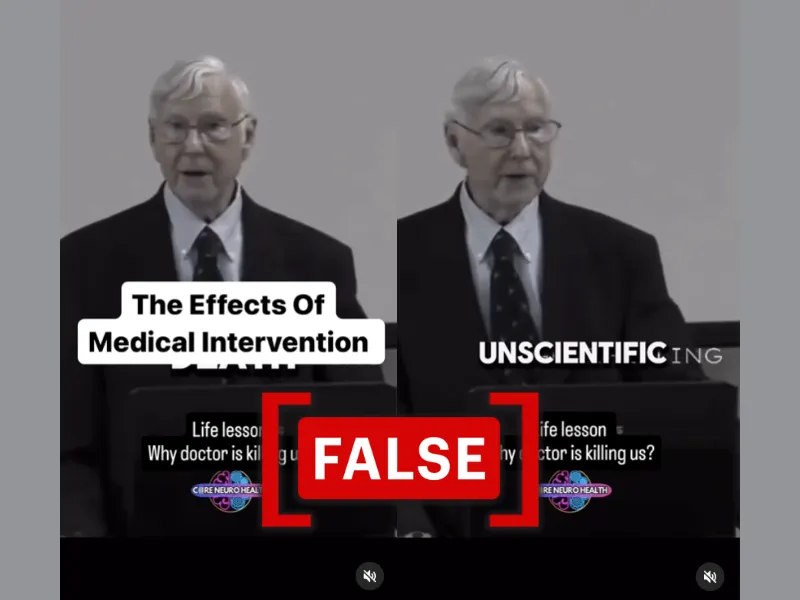By: Karin Koronen
October 16 2024
 Source: Instagram/Screenshot/Modified by Logically Facts
Source: Instagram/Screenshot/Modified by Logically Facts
In 2023 and 2022, the leading causes of death in the U.S. were heart disease, cancer, and unintentional injury.
Context
In a video shared on Instagram (archived here), Raymond Francis, a self-described chemist and author, claims that medical interventions kill about a million people a year in the U.S., making it the leading cause of death. He further alleges that 85 percent of what is taught in medical schools is "unscientific nonsense" and that it is "so far behind science that it is impossible to bring it up to date."
He also criticizes pharmaceutical interventions, calling them poison, driven by monetary interests. At the end of his speech, Francis compares trauma care and crisis intervention, allegedly making up for 15 percent of medicine, to all the other interventions, dismissing the latter as nonsense.
The post was shared on Instagram by multiple accounts (archived here, here, and here), ranging from 33,000 to 971,000 followers. Many of these accounts are known for spreading medical information that contradicts scientific consensus and have made numerous posts that have been subject to fact-checking.
Francis has a history of criticizing and questioning contemporary medicine and advocating for alternative methods, such as detoxes and supplements, which lack scientific evidence. For instance, his claim that saunas are necessary to eliminate oil-soluble toxins from the body has been previously debunked by Logically Facts, as there is no reliable evidence to support this.
The claims that Francis made in this video are false.
In fact
Raymond Francis is not a licensed medical professional and has a history of promoting unverified health advice. He has faced criticism for oversimplifying medical conditions and offering unsupported remedies.
His assertion that medical intervention causes one million deaths annually, ranking it as the leading cause of death in the U.S., is not supported by credible research or statistics. According to the U.S. Department of Health & Human Services, in 2022 and 2023, the leading causes of death in the U.S. were heart disease, cancer, and unintentional injury.
The impact of medical interventions on overall mortality is challenging to measure due to confounding variables, variations in patient populations, differences in healthcare systems, and the complexity of attributing death to specific causes or interventions.
Estimates of widespread harm are often exaggerated, and although some studies, such as "Medical error—the third leading cause of death in the US," published in 2016, seem to be somewhat in accordance with Raymond Francis's claims, they have faced intense criticism for their methodology and data use.
Even this widely cited study estimates that approximately 251,454 deaths a year in U.S. hospitals result from medical mistakes—a figure ten times higher than previous estimates—but still falls significantly short of the one million deaths claimed by Francis.
His claim that 85 percent of medical education is "unscientific nonsense" lacks evidence and disregards the rigorous, peer-reviewed process that underpins medical training. Furthermore, no credible evidence suggests that medications, subject to a multifaceted approval process, including tests and trials, are designed to harm patients.
The verdict
The claim that medical interventions are the leading cause of death in the U.S. is false. There is no evidence to support the statistic of one million deaths annually due to medical intervention, and established sources indicate that the leading causes of death are heart disease, cancer, and unintentional injury.